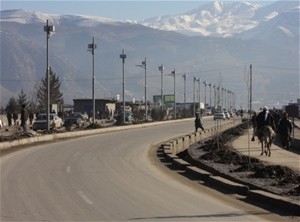
Newly installed solar streetlights line the road into Fayzabad in Badakhshan Province. The road itself, which links Fayzabad with Keshim to the west, is also a recently completed USAID project.
USAID/ACDP/Zularistan
New solar streetlights enhance safety, security, and stability in a city unconnected to the national power grid
9 DECEMBER 2011 | BADAKHSHAN, AFGHANISTAN
Besides reducing the municipality’s need for costly diesel fuel, the solar lights will improve air quality, reduce crime, facilitate nighttime traffic, extend market hours along the roadway, and improve security for Fayzabad’s citizens.
Sixty newly installed solar-powered streetlights in Fayzabad bring much-needed light to a city that is not connected to the national power grid. Each streetlight illuminates an area of 225 square meters – enough to cover the street, sidewalks, and local shops. Two solar panels that charge a large battery throughout the day powers each 30-watt LED light. At sunset, the lights turn themselves on automatically and remain on until early the next morning. When it is cloudy, the batteries have enough energy to power the lights for up to three days. All valuable components – panels, battery, and light – are located at the top of a 12-meter pole in order to deter vandalism and theft.
Illuminating a section of the recently completed Keshim-Fayzabad highway, the USAID-funded solar lights will reduce Fayzabad municipality’s need for costly diesel fuel while improving air quality. The lighting will also reduce crime, facilitate nighttime traffic, extend market hours along the roadway, and improve security for Fayzabad’s citizens.
“Security will be improved and vehicle accidents will be prevented by the installation of these solar streetlights. This kind of project has a very good impact on Fayzabad,” said Governor of Badakhshan Dr. Shah Wali Adeeb. When Governor Adeeb and the mayor of Fayzabad walked the city streets after the new lights were installed, the lights lit up one by one, and local shopkeepers and pedestrians expressed their appreciation.
Upon completion of its solar streetlights project, USAID will have installed 480 units in ten provinces in eastern and southern Afghanistan.
USAID is committed to building the capacity of the Afghan government to provide its people with clean, renewable energy to power their homes, schools, and businesses by fostering energy independence and development through increased use of renewable energy, increased energy efficiency, and establishment of a local renewable energy equipment and service industry.







Comment
Make a general inquiry or suggest an improvement.